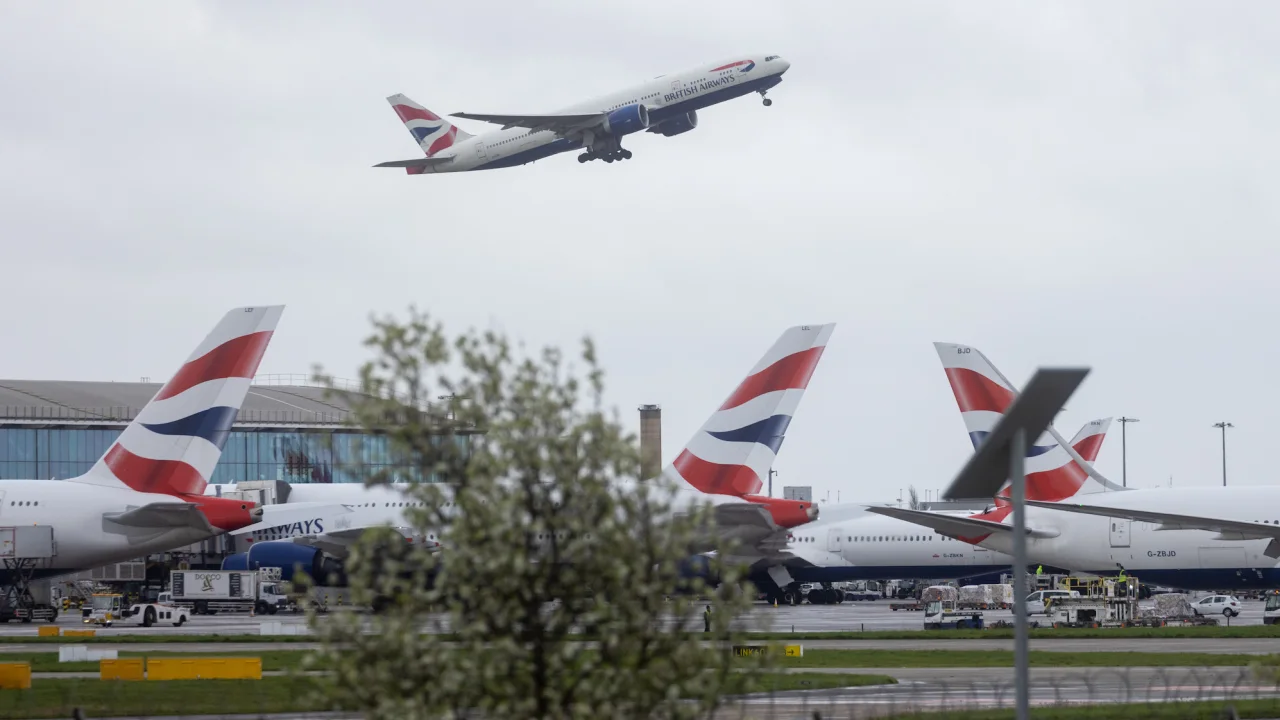Air Travel Technical Glitch Sparks Delays Across Europe's Busiest Airports
Air travel technical glitch sparks delays across Europe's busiest airports, thousands of passengers were subjected to lengthy delays and cancellations. National Air Traffic Services restricted the number of landing flights, stranding people in the United Kingdom and elsewhere.
Author:Dexter CookeReviewer:Hajra ShannonAug 29, 20235K Shares463.3K Views

Air travel technical glitch sparks delays across Europe's busiest airports, and thousands of passengers were subjected to lengthy delays and cancellations.
National Air Traffic Services restricted the number of landing flights, stranding people in the United Kingdom and elsewhere.
Technical Issue Disrupts UK Air Traffic Control
Thousands of travelers across Europe were left stranded as the UK's air traffic control system, operated by the National Air Traffic Services (NATS), suffered a technical glitch, resulting in restrictions on flights.
The disruption occurred on a key day at the end of a summer public holiday weekend in the UK.
NATS released a statement acknowledging the technical issue and confirming that it had identified and remedied the fault.
“„Our engineers will be carefully monitoring the system’s performance as we return to normal operations.- National Air Traffic Services (NATS)
“„The flight planning issue affected the system’s ability to automatically process flight plans, meaning that flight plans had to be processed manually which cannot be done at the same volume, hence the requirement for traffic flow restrictions.- National Air Traffic Services (NATS)
The organization assured travelers that it was working closely with airlines and airports to manage the affected flights as efficiently as possible.
It also stated that its engineers would closely monitor the system's performance as operations returned to normal.
Airlines And Airports Respond
Major UK airports, including Heathrow, Gatwick, and Manchester, reported significant delays and cancellations. British Airways, Virgin Atlantic, Ryanair, and Jet2 were among the airlines affected by the disruptions.
Passengers were advised to check with their airlines and anticipate delays. The air traffic control failure prompted concern over potential long-lasting disruptions and a subsequent headache for airlines in reestablishing normal flight schedules.
Passengers described the chaos and inconvenience caused by the delays. Some were forced to pay for hotel accommodations, miss crucial appointments, and endure lengthy waits at airports.
Flight cancellations, delays, and the manual processing of flight plans led to a cascade of disruptions affecting travelers.
Passenger Rights And Responses
Experts speculated that the disruption caused by the technical glitch could have ripple effects for several days, affecting both passengers and airlines.
The aviation industry braced for extended recovery efforts to restore normal operations, manage affected flights, and accommodate passengers' needs.
Transport Secretary Mark Harper advised affected passengers to stay updated by contacting their airlines and referred them to the UK Civil Aviation Authority's guidelines regarding passenger rights during delays and cancellations.
The guidelines outlined airlines' duty of care to provide essential services like food, drink, and accommodation during extended delays.
The authorities also recommended that passengers affected by cancellations be offered the choice of a refund or alternative travel arrangements.
Aviation experts noted that such technical faults in air traffic control systems are extremely rare, with the last notable instance occurring in 2014.
The system's failure necessitated manual processing of flight plans, causing reduced capacity and requiring traffic flow restrictions to maintain safety standards.
As the aviation industry worked tirelessly to address the disruptions caused by the technical glitch, passengers and airlines braced for the impact of ongoing delays, cancellations, and the intricate process of rescheduling flights and accommodating passengers' travel plans.
AirNav, an Irish company that helps control air traffic, said that there were "significant delays" on Monday for planes in UK airspace.
“„Flights between Ireland and UK airports, and flights traveling to or from Ireland that travel through UK airspace are experiencing significant delays. NATS said it was working with airlines and airports to “manage the flights affected as efficiently as possible.”At this time, there is no certainty as to when flights will be back on schedule, so passengers who are due to travel today should contact their airlines in the first instance to check if their flights are delayed.- AirNav, an Irish company
Final Words
In the midst of one of the busiest travel days of the summer, a technical glitch in the UK's air traffic control system sent ripples of disruption across European airports.
Thousands of passengers faced delays, cancellations, and uncertainty, while airlines worked to manage the fallout and reestablish normal flight operations.
The incident highlighted the complex challenges that can arise from unexpected technical failures in critical aviation systems, underscoring the importance of passenger rights and efficient recovery efforts to minimize the impact on travelers and the industry as a whole.

Dexter Cooke
Author
Dexter Cooke is an economist, marketing strategist, and orthopedic surgeon with over 20 years of experience crafting compelling narratives that resonate worldwide.
He holds a Journalism degree from Columbia University, an Economics background from Yale University, and a medical degree with a postdoctoral fellowship in orthopedic medicine from the Medical University of South Carolina.
Dexter’s insights into media, economics, and marketing shine through his prolific contributions to respected publications and advisory roles for influential organizations.
As an orthopedic surgeon specializing in minimally invasive knee replacement surgery and laparoscopic procedures, Dexter prioritizes patient care above all.
Outside his professional pursuits, Dexter enjoys collecting vintage watches, studying ancient civilizations, learning about astronomy, and participating in charity runs.

Hajra Shannon
Reviewer
Hajra Shannona is a highly experienced journalist with over 9 years of expertise in news writing, investigative reporting, and political analysis.
She holds a Bachelor's degree in Journalism from Columbia University and has contributed to reputable publications focusing on global affairs, human rights, and environmental sustainability.
Hajra's authoritative voice and trustworthy reporting reflect her commitment to delivering insightful news content.
Beyond journalism, she enjoys exploring new cultures through travel and pursuing outdoor photography
Latest Articles
Popular Articles